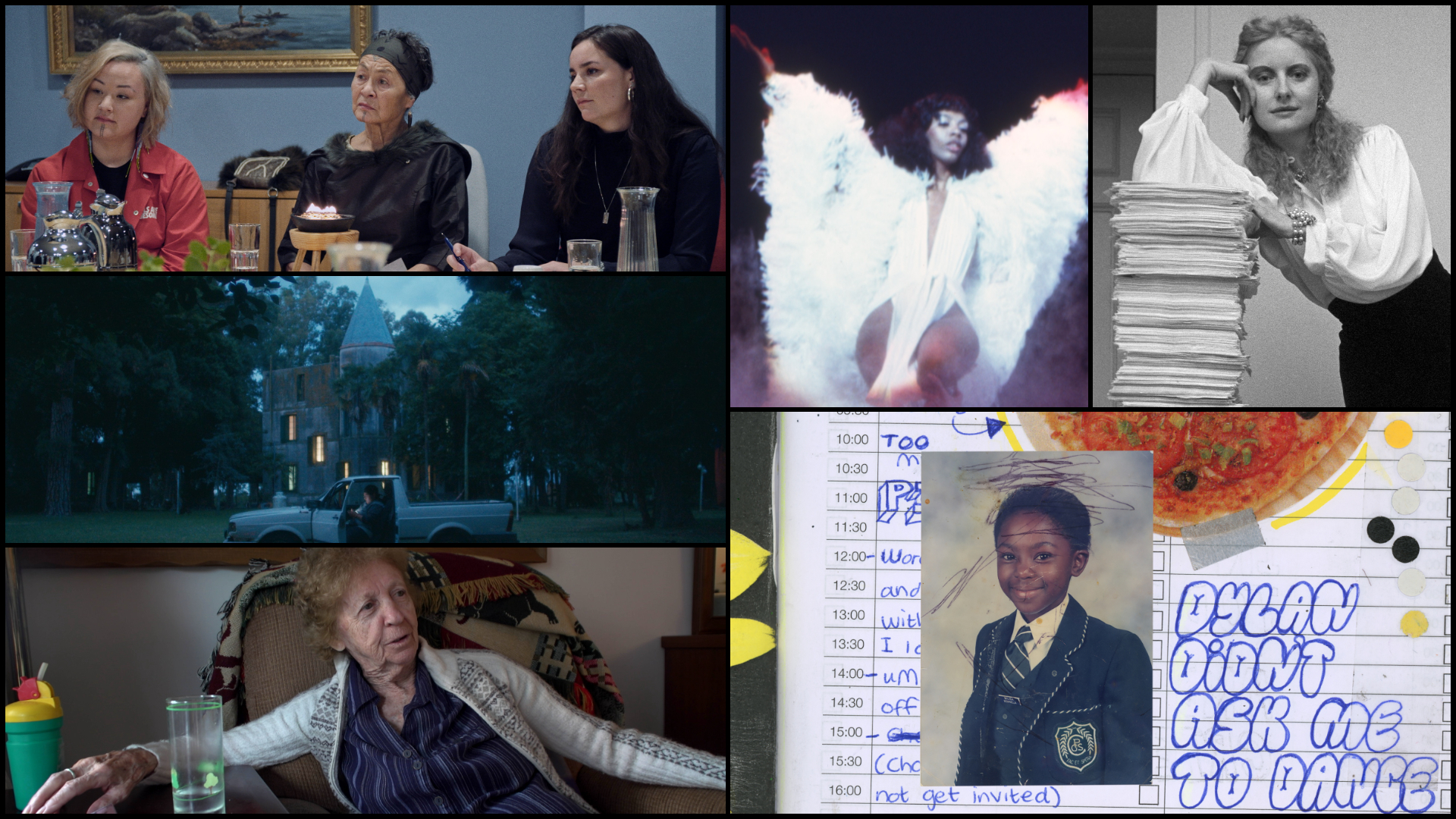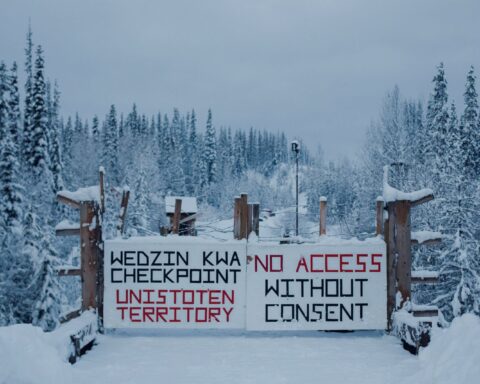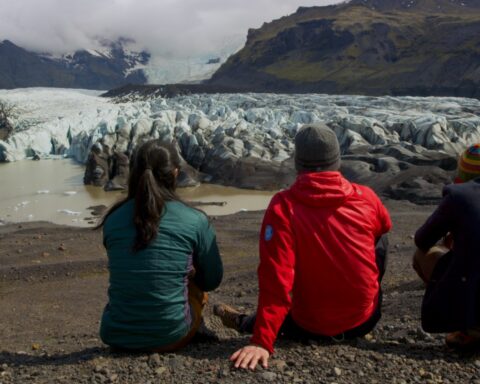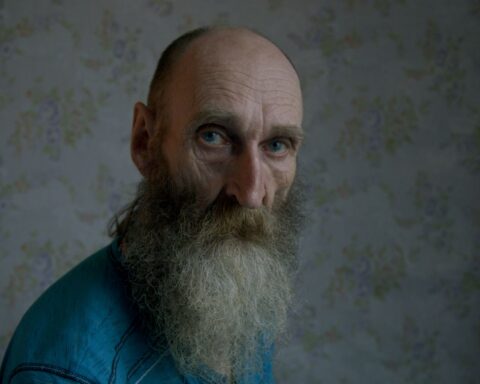Toronto is heating up! It might be an unseasonably warm 25 degrees in the city right now, but we’re not talking about the weather: Hot Docs is only two weeks away. It’s still too early for our writers to weigh in on all the new documentaries that are premiering at the festival—you’ll have to grab a copy of our Hot Docs issue for those tips. However, the POV team has seen a sizable chunk of the Hot Docs line-up so far thanks to coverage at festivals like Sundance, RIDM, and Berlin. Many of the “best of the fest” picks from other events are hitting Toronto this month.
To help guide POV readers, here are 23 films at Hot Docs ’23 we caught on the circuit. Many of the must-see international docs at the fest are on this list.
5 Seasons of Revolution
Screens in: Persister
Deep fake and AI are the hot topic right now, but 5 Seasons of Revolution isn’t exactly Welcome to Chechnya. Directed by a filmmaker simply credited as “Lina” and executive produced by Laura Poitras, this study of the war in Syria has the best of intentions. However, with several participants obscured by unconvincing AI or masking, which varies depending upon the angle or circumstances of a scene, the film loses coherence due to the technical conceit. While the technical work distracts, it also prevents one from building any real connection to the characters. “It’s clear that Lina’s courage is to tell the story despite all obstacles, a story of friendship and protest and sacrifice,” wrote Jason Gorber at Sundance, “but it’s a tale not yet written as to whether the actions of these few over the last decade were of consequence or merely a sideshow of a sideshow for the larger context of the nation’s upheaval.”
20 Days in Mariupol
Screens in: Made in Ukraine
Don’t make plans to go to a Hot Docs party after seeing 20 Days in Mariupol. This Sundance Audience Award winner is absolutely devastating. Director Mstyslav Chernov gives the best portrait of the war in Ukraine so far with this feat of reportage that expands upon his coverage as an Associated Press videographer. The film delivers gripping footage from the front lines of a war zone, but also explores the sheer difficulty—both practical and moral—entailed in telling the story. The most suspenseful moments, for example, see Chernov trying to find a stable WiFi signal to upload his footage. Meanwhile, the film as a whole offers expanded context to situate news footage within a larger war between truth and misinformation.
“Some of the people who watch the film now will look at the news in a different way,” said Chernov in an interview with Jason Gorber during Sundance. “They’ll remember there is a person behind the camera, that there are feelings there, and that this person was in danger, was suffering, was a part of the community, or was a foreigner. How does this information shape the world, or shape the media’s case?” Read more about docs that capture the war in Ukraine in our upcoming issue.
Against the Tide
Screens in: World Showcase
Fans of Oscar nominee All that Breathes might want to catch this Sundance flick that’s drawn comparisons to last year’s festival hit. Against the Tide, directed by Sarvnik Kaur, observes two friends in India whose work as anglers reflects a larger consideration of the struggle between contemporary practices and a traditional way of life. “This is a quiet, deliberate film, and while there are no particularly grand revelations, it’s clear that by focussing on these two individuals, a greater tale of a nation that has recently become the most populous in the history of our planet can be told,” wrote Jason Gorber during Sundance. “It’s in the precision and specificity of the telling that gives the film much of its impact, and thanks to the editing prowess of Atanas Georgiev and Blagoja Nedelkovski who helped shape the much celebrated Honeyland, the story unfolds in an effective and engaging way.”
Anhell69
Screens in: Nightvision
Audiences looking for a punch in the face of great cinema at Hot Docs will find it in Anhell69. Colombian filmmaker Theo Montoya takes a hybrid approach to this portrait of youth alienation in his home country. Anhell69 mixes vampires and zombies in a film-within-a-film telling of broken dreams and lost hope. The film itself is haunted by ghosts, too, as Montoya captures the final works by many cast and crew members who died during or shortly after production. “One gets the sense that Montoya felt driven to keep filming, even after the distinct roadblock of having a key cast member die,” wrote Matthew Hays during RIDM. “Anhell69 is raw, uncompromising and disturbing, the best kind of transgressive documentary filmmaking.”
The Castle
Screens in: World Showcase
Hailed by POV contributor Ezra Winton as “a gorgeous genre-bending film that renders the everyday fantastic,” The Castle marks a Hot Docs must for doc fans seeking films that break from formula. This acclaimed doc has echoes of Grey Gardens as it takes audiences inside a massive castle-shaped mansion to observe the family that dwells within. Where Grey Gardens saw the Beales occasionally playing themselves up for the camera, The Castle tasks its participants with playing roles through a unique docu-fiction approach. “The Castle defies easy classification: since it isn’t magical realism, what should we call this direction in fiction-non-fiction cinema? Perhaps it’s fantastic realism,” wrote Winton.
The Deepest Breath
Screens in: Special Presentations
There’s an ironic lack of depth to The Deepest Breath. This underwater odyssey looks amazing thanks to some smart underwater cinematography, but it loses its way with its portrait of divers Stephen and Alessia. The doc treads murky waters as it leaves much unexamined. “The Deepest Breath doesn’t quite live up to its title when trying to make sense of the individuals involved, although Stephen’s journey certainly seems a bit more altruistic than Alessia’s naked competitiveness,” noted Jason Gorber during Sundance. “Outside of the broad competitions that presumably assist with fame and finance, it’s the habit of doing dangerous dives ‘just because’ that seem all the more reckless from the outside.”
The Disappearance of Shere Hite
Screens in: Special Presentations
One of Sundance’s strongest films deserves your attention. Crip Camp director Nicole Newnham gives an invigorating study of women’s rights and the danger of speaking up in The Disappearance of Shere Hite. The film brilliantly dives into the work of the sex researcher and writer who sparked controversy with her findings about women’s sexuality. The misogynistic response to her work, meanwhile, speaks volumes about the necessity for publishing such work that inspires people to look within themselves and question the status quo.
“The Disappearance of Shere Hite doesn’t suggest that Hite’s work, nor her persona, were perfect,” I wrote during Sundance. “However, the portrait of her defensiveness, too, adds to the film’s power. Embedded within her work, flaws and all, is a rallying cry to move beyond rigid and established systems. This film speaks with a fiery spark that should empower generations of viewers who share Hite’s hunger for change. And if it irks another generation of men unwilling to accept progress, then so much the better.”
The Echo
Screens in: World Showcase
Winner of the Best Documentary Award at this year’s Berlinale, Mexican-Salvadorian director Tatiana Huezo proves herself adept in the worlds of fiction and non-fiction. Her latest, The Echo, takes audiences to a rural village outside Mexico City. Framing her observation with the stories of young women and girls, The Echo captures the rituals, chores, and daily rhythms of rural life. “Huezo manages to strike a tonal chord that is both disquieting and jubilant,” wrote Ezra Winton at Berlin. “It’s a hypnotic combination that honours the rural lives of the family depicted, while also subtly suggesting it is a life of hardship, toil and preciousness…Huezo’s considered lens does not glorify or gloss over the challenges of rural life in Mexico, but allows for resplendent moments from the imaginative, playful world of children to seep in and linger long past the credits.”
The Eternal Memory
Screens in: World Showcase
All the Kleenex in the world won’t prepare you for The Eternal Memory. This latest film from The Mole Agent Oscar nominee Maite Alberdi is a truly moving film. It’s a worthy winner of this year’s Grand Jury Prize for World Cinema at Sundance. The Eternal Memory brings to Hot Docs its observational portrait of long-time Chilean couple Paulina and Augusto. The film witnesses how love never fades as Augusto slips away due to Alzheimer’s while Paulina devotes herself to his care. “As The Eternal Memory connects past and present while observing Augusto’s state of mind, the film tenderly underscores the power that emotional responses hold in our memory,” I wrote during Sundance. “Even when it takes Augusto hours to recognize Paulina, the flicker of love that returns to his eyes illustrates how the heart stores memories of its own.”
Food and Country
Screens in: Special Presentations (Big Ideas)
Cinephiles excited for the IRL part of Hot Docs might be in for a trip with Food and Country. The film captures an important study of the USA’s crumbling food economy as director Laura Gabbert follows writer Ruth Reichl as she speaks with farmers, restaurateurs, and others feeling the pinch. However, for anyone feeling Zoom fatigue or struggling with too much screen time these days, it’s nearly two hours of watching other people on Zoom, which reflects the challenges of adapting the pandemic. “Much of the film favours Zoom interviews, although one can certainly relate to the pile of books on which Reichl places her computer to ensure decent framing. Her interviewees don’t often do the same, though, and the result isn’t aesthetically pleasing,” I wrote during Sundance. “There’s only so much time one can spend watching other people on Zoom after spending all day on the computer.”
I Lost My Mom (J’ai placé ma mère)
Screens in: Canadian Spectrum
A difficult but important perspective from the COVID-19 lockdowns comes in Denys Desjardins’ I Lost My Mom. The film is an intimate portrait of the death of the filmmaker’s mother. Desjardins shares the distressing experience of being unable to visit her in her long-term care facility and the pain of knowing that she’s alone. “As much as the documentary follows the final years of his mother’s life, through his narration, old photographs, and home videos, the film also serves as an ode to motherhood seen through the eyes of a devoted son,” wrote Allegra Moyle during RIDM. “While the documentary consists of poignant social commentary, Desjardins’ love for his mother is the film’s lifeblood, which simultaneously adds to, and cuts through, the tragedy.”
Iron Butterflies
Screens in: Made in Ukraine
An unexpected portrait of the war in Ukraine, meanwhile, comes in Iron Butterflies. Director Roman Liubyi focuses on the 2014 downing of Malaysia Airlines Flight 17 and the battle for narratives that are a part of wartime. Iron Butterflies mixes archival news footage, citizen journalism from cell phones and social media, verité footage from the ground, and some dance numbers and dramatic scenes that underscore the fissures between fact and fiction. “Liubyi takes on the incredibly difficult task of making sense of something nonsensical, and thanks to his acute eye for story, his impeccable skills of montage, and remarkable source material gathered for the criminal investigation, we’re treated to something as special as it is indelible,” wrote Jason Gorber at Sundance. “This film is an incredible achievement, and should be mandated viewing for anyone even beginning to make sense of what’s taking place this very moment in the region.”
Is There Anybody Out There?
Screens in: Special Presentations (Big Ideas)
Like fellow Big Ideas selection Food and Country, Is There Anybody Out There? might be more worthwhile for the post-screening conversation than for the film itself. Director Ella Glendining turns the camera upon herself as she chronicles her quest to find someone else on Earth who shares her disability. The film makes some crucial points about ableism and inclusion, but it lapses into too many cell phone selfie confessionals and doesn’t benefit from Glendining’s inexperience as a filmmaker and interviewer, despite the earnestness of her efforts. “While one must admire what the well-intentioned Anybody offers in terms of representation and visibility, it is admittedly very rough as a feature film playing among a dozen titles competing in the world’s most prestigious showcase for documentary,” I conceded while reviewing the film at Sundance. The film honestly looks much like her Sundance diary below, which is fine for a YouTube short, but not ideal for a feature.
It’s Only Life, After All
Screens in: Special Presentations (Big Ideas)
Another entry in the Scotiabank Big Ideas series of Hot Docs 2023 is this upbeat Indigo Girls doc. It’s Only Life After All offers perhaps the biggest name of the Big Ideas series with its portrait of folk pop duo Emily Saliers and Amy Ray. Saliers joins director Alexandria Baumbach (On Her Shoulders) for the post-screening convo. The film, which opened Sundance 2023, takes audiences through an exhaustive account of the Indigo Girls’ unlikely success, especially in a male-dominated industry. It needs to lose 20 minutes, but it’s a good time with great music. “As two out-and-proud lesbians strumming poetically buoyant acoustic music when angry dad rock ruled the airwaves, they stood out because of the story they had to tell,” I wrote during Sundance. “The doc remains true to this spirit. It might be conventional and overlong, but there are welcome notes to be enjoyed here.”
The Longest Goodbye
Screens in: Human Kind
Is it hard to shake the feeling of being cooped up? The Longest Goodbye should strike a nerve with viewers thanks to its tale of isolation. The film directed by Ido Mizrahy takes audiences to space with its study of the effects of isolation on astronauts. Mizrahy explores this psychology twofold by looking at NASA’s HERA programme, which tasks humans on Earth to shadow space missions so that NASA can understand and anticipate astronauts’ behaviour. “Here’s a beautiful metaphor for what we go through all the time, but it’s real,” said Mizrahy in an interview at Sundance. “This job is real and if he doesn’t do it well, these missions are going to be incredibly dangerous. It was a nice meeting place between finding something to document and a way to talk about something that’s much more terrestrial.”
Love to Love You, Donna Summer
Screens in: Special Presentations
While it doesn’t screen on closing night of Hot Docs, doc fans can enjoy a last dance with Donna Summer. This acclaimed music doc gives the disco diva her due with a toe-tapping exploration of her career, including all the highs, lows, controversies, and contradictions. Directed by Oscar winner Roger Ross Williams and Summer’s daughter, actor/filmmaker Brooklyn Sudano, Love to Love You, Donna Summer could serve as a definitive portrait of a star and her influence. “There’s almost no contemporary pop music that doesn’t owe something to the DNA of songs like ‘I Feel Love,’ and there’s direct correlation to the mega-divas of today following in Summer’s footsteps,” wrote Jason Gorber at Berlin. “From a strictly musical history perspective, the film does an admirable job of illustrating this fact without succumbing to false analogies or bending backwards to appease younger viewers.”
Milisuthando
Screens in: World Showcase
I’ve said this before in the pages of POV and on my Twitter feed and I’ll say it again: I saw nearly every documentary at Sundance this year and Milisuthando was the best in a runaway. Fans of essay films like Sans soleil or A Night of Knowing Nothing will be awed by the ingenuity of this first feature. Milisuthando Bongela proves a true breakthrough behind the camera as she considers the fractured nature of identity and community while examining South African apartheid. “Bongela creates a radical form of decolonial cinema that shatters all the rules,” I wrote during Sundance. “It’s a five-part, first person exploration of South African apartheid, Blackness, and the perceived invisibility of race. More than that, though, it combs through the archives and weaves between past and present to consider loss amid the fissures of history. It’s a tough and frank feat of self-assessment that asks if we’ll ever really dissolve racial divides.”
Non-Aligned: Scenes from the Labudović Reels
Screens in: Artscapes
On the heels of the inspiring TIFF Docs selection Ciné-Guerrillas: Scenes from the Labudović Reels last fall, director Mila Turajlić continues her exploration of the career of Yugoslav cameraperson Stevan Labudović and the revolution he captured on film. This film-on-film odyssey favours verité where Ciné-Guerillas mined the archives to share Labudović’s work. Turajlić tells the story of the Non-Aligned movement that brought together like-minded revolutionaries with participants from Africa and Asia who weren’t associated with either of the Cold War blocs. She situates Labudović’s cinematography among this movement.
“Once I had put together a timeline of how the Non-Aligned movement came together and then a timeline of where he had filmed, that’s when I had this aha moment,” Labudović told Megan Durnford at IDFA. “He was witness to the birth of this movement and his images gave birth to it in many ways. So there is this double play of witnessing something but also fabricating its image, bringing into existence visually.”
Smoke Sauna Sisterhood
Screens in: Persister
Sweat it out with the girls of Smoke Sauna Sisterhood. This cathartic directing winner from Sundance’s World Cinema Competition invites audiences to enter a unique space. Director Anna Hints offers a feat of women talking as she brings her camera inside a sauna. Women reflect upon their agency, sexual violence, and survival as they cleanse their bodies and souls. “The common denominator here is one of power, of losing it and of finding a way of regaining it,” wrote Barbara Goslawski at Sundance. “Each woman undergoes her own process of moving through pain and into power. In this way, Hints is able to foreground the inner strength of each woman. It’s ingenious how she does this by placing the spotlight solely on the female body.”
Still: A Michael J. Fox Movie
Screens in: Special Presentations
Academy Award winner Davis Guggenheim gives actor Michael J. Fox the blockbuster treatment in Still. This deeply moving and highly entertaining film tells Fox’s story mostly through the movies and TV roles he’s enjoyed throughout the years. Still is a film-on-film archival adventure with Fox at the centre as he reflects upon his career, his life with Parkinson’s disease, and the pains of sitting still.
“Guggenheim cleverly intercuts scenes from various projects with interstitial recreations of moments from the star’s real life, while a droll voiceover drawn from his memoir is read in Fox’s own voice,” wrote Jason Gorber while reviewing the film at Sundance. “This allows the audience not only insight into the past but how some scenes can be recontextualized through the lens of the diagnosis, spotting the way the actor would grasp or spin around objects with his left hand to try and stave off the overt systems. At the time, everyone from the production to the audience was oblivious to what was taking place. Years later, though, we can see the very real struggle through Fox’s eyes and the abject fear about all that was soon to be taken away.” Subscribe today to read an interview with Guggenheim in our next issue!
A Still Small Voice
Screens in: World Showcase
This U.S. winner for the directing prize at Sundance is a standout character study. Director Luke Lorentzen delivers perhaps the ultimate portrait of a frontline worker during the COVID-19 pandemic with this portrait of Margaret “Mati” Engel. A Still Small Voice follows Mati as she undertakes her residency at Mount Sinai Hospital to become a chaplain. The film captures extremely intimate moments as Mati offers guidance for people reeling from loss—often sudden and expected. “One sees this duty of care in every frame of the film,” I wrote during Sundance. “Lorentzen generally keeps the camera on Mati. Sometimes filming through doorways or peering around curtains, there’s a clear line of respect for the difficulty of the situation. In doing so, the approach, much like Mati’s healthy administration of tough love, perfectly captures the delicacy of administering spiritual care.”
The Stroll
Screens in: World Showcase
Bold, timely, and beautiful, The Stroll walks audiences through an essential chapter of trans history. Director Kristen Lovell joins forces with Framing Agnes star Zackary Drucker to tell the story of a strip in New York City’s meatpacking district where transwomen made a living as sex workers for decades. The Stroll takes audiences to that part of NYC through the stories of these women, including Lovell, who reflect upon a changing city and what has—and hasn’t—changed for trans rights. “The Stroll ultimately thrives from the hopefulness and spirit of its subjects. Their emotional accounts testify to the challenge of being treated as less than second class,” I wrote during Hot Docs. “Moreover, as the subjects step away from the interview chairs and tour the gentrifying meatpacking district, The Stroll captures the prevailing attitude towards trans history.”
Twice Colonized
Screens in: Special Presentations (Opening Night)
This list closes with the opener as a Hot Docs favourite returns! Angry Inuk star Aaju Peters gets another bigscreen treatment with Twice Colonized. Directed by Lin Alluna with Angry Inuk director Alethea Arnaquq-Baril among its producers, this Danish-Canadian co-pro follows Peters as she continues to fight for Indigenous, Inuit, and First Nations communities to have a say in their own affairs. The film may be a might darker than Angry Inuk due to events that happen in Peters’ life, but her strength again remains an inspiration. If anything, the heartache makes the fight twice as fierce.
“I always have to remind people that we have different colonizers at different points and that things have evolved at different speeds,” said Peter in an interview with POV. “The Danes, even though they developed infrastructure, they have a lot to learn from the Canadian examples as well, and the Canadian Arctic has a lot to learn. I’m hoping that this documentary of being twice colonized will get the conversation going. We are not the same.”














